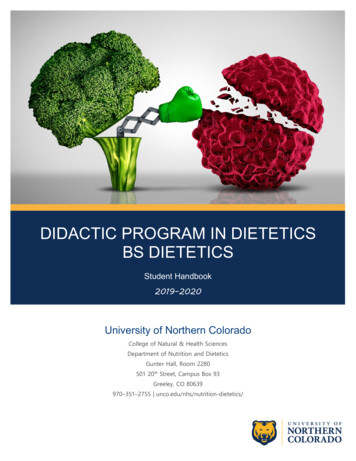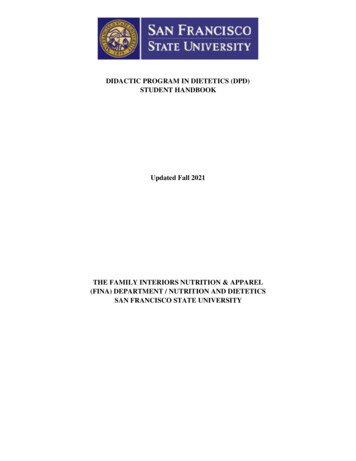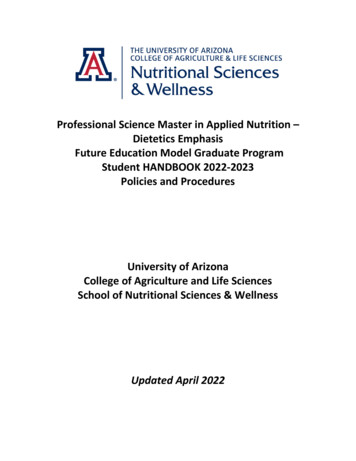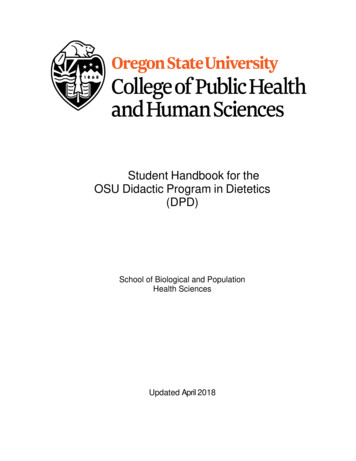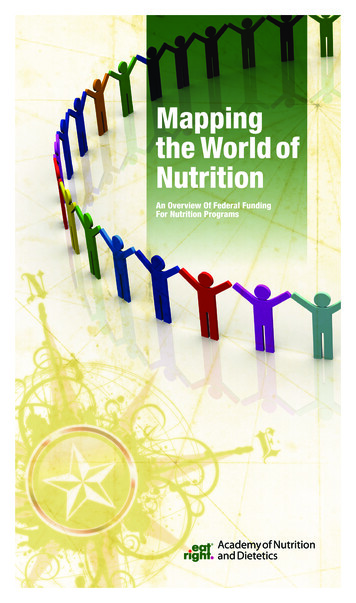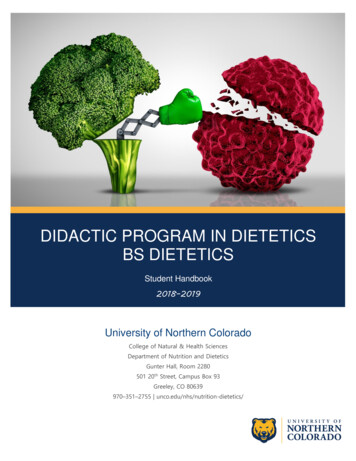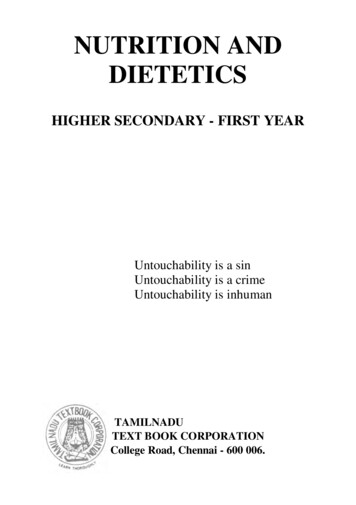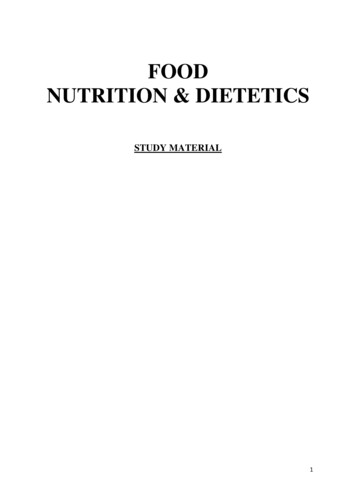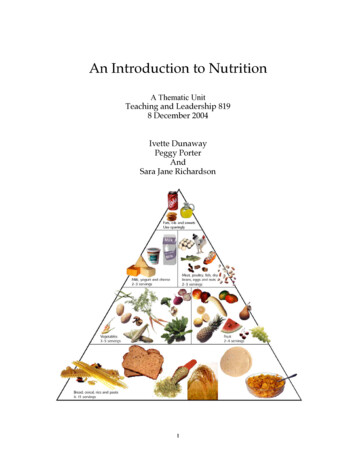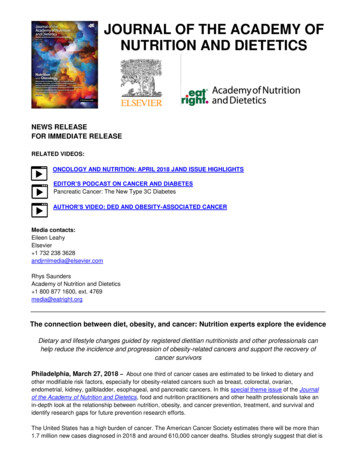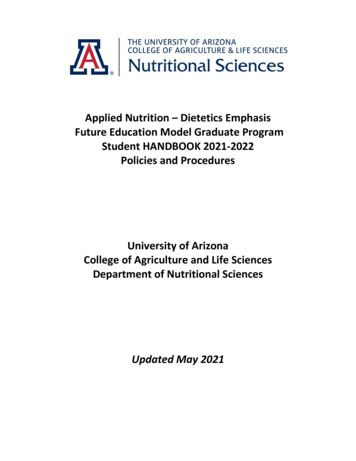
Transcription
Applied Nutrition – Dietetics EmphasisFuture Education Model Graduate ProgramStudent HANDBOOK 2021-2022Policies and ProceduresUniversity of ArizonaCollege of Agriculture and Life SciencesDepartment of Nutritional SciencesUpdated May 2021
WELCOME to the Applied Nutrition – Dietetics Emphasis Future Education Model – Graduate Program(FEM-G) in the Department of Nutritional Sciences at the University of Arizona. This handbook is designedto serve as a resource for you during your time as a student in our program. If you have any questions,please do not hesitate to contact us.Department Head:Scott Going, PhDDepartmental Information:1177 E. 4th StreetShantz Building, Room 309Tucson, AZ 85721Phone: 520-621-1187Fax: 520-621-9446nscdept@cals.arizona.eduFEM-G Director:Kayle Skorupski, MS, RDN-AP, CNSC, FANDkayleskorupski@arizona.eduFEM-G Coordinator:Kaydi Williams, PSM, RDNkaydiwilliams@arizona.edu1
TABLE OF CONTENTSDepartment InformationProgram InformationAccreditation StatusProgram Mission, Vision, and GoalsAdmission RequirementsSupervised Experiential Learning Site SelectionFacultyAdvisingSupport ServicesPrivacyAccess to Personal FilesStudent ComplaintsProgram CostsInsurance RequirementsDrug Testing and Criminal Background ChecksIdentity VerificationNetID and EmailCatCardD2L BrightSpaceDistance Education RequirementsFinancial AidWithdrawal and Refund of Tuition and FeesAcademic CalendarSemester ScheduleCourse Requirements and DescriptionsMonitoring Student Performance & Student RetentionAssessment of Prior LearningSupervised Experiential Learning DocumentationLiability for Safety in Travel to or from Assigned AreasInjury or Illness while in a Facility for Supervised Experiential LearningEducational Purpose of Experiential and Supervised Practice ExperiencesFormal Assessment of Student Learning and Regular Reports of PerformanceGraduation, Program Completion & Verification Statement RequirementsConditions for Graduation from FEM-Graduate ProgramSteps to obtain the RDN credential from the FEM-Graduate 2323242424252626152
Nutritional Sciences DepartmentThe Department of Nutritional Sciences leads in cutting-edge research, outstandingundergraduate and graduate programs, Cooperative Extension programs and continuingprofessional education that advance the discovery and translation of nutrition and physicalactivity in optimizing health for people in Arizona, and beyond.Program DescriptionThe Professional Science Masters in Applied Nutrition - Dietetics Emphasis is an ACENDaccredited Future Education Model - Graduate Program. The 12-month program combinesonline coursework through Arizona Online Campus with supervised experiential learning atcommunity, clinical, and food service sites. In order to become a Registered DietitianNutritionist RDN), graduates must complete the required coursework and supervisedexperiential learning hours (1000 hours). Following completion of the program, a national examis required as the final step to earn the RDN credential.Accreditation Status (Required Element 8.3a)The Applied Nutrition – Dietetics Future Education Model Graduate Program (FEM-Graduate) isan accredited program by the Accreditation Council for Education in Nutrition and Dietetics(ACEND). The University of Arizona Department of Nutritional Sciences houses a DidacticProgram in Dietetics (DPD) delivered at 3 unique campuses (UA Main, UA Yuma, and ArizonaOnline), an Individualized Supervised Practice Pathway (ISPP) is available in two tracks: UAMain- Tucson and a Distance option in addition to the FEM-Graduate Program offered throughArizona Online campus.University of Arizona Applied Nutrition – Dietetics Future EducationModel – Graduate Program is accredited by the Accreditation Council forEducation in Nutrition and Dietetics of the Academy of Nutrition andDietetics, 120 South Riverside Plaza, Suite 2190, Chicago, ILProgram Mission Vision, and Goals (Required Element 8.3b)The Nutritional Sciences Department at the University of Arizona takes a collaborative andinterdisciplinary approach to discovering, integrating, extending and applying knowledge andskills related to nutritional sciences to prevent disease and to promote optimal nutritionalstatus, health and well-being. The Nutritional Sciences Department is housed in the College ofAgriculture & Life Sciences (CALS).CALS’ purpose, mission and vision are:Purpose:To ensure resilience and health of our communities, people, environments, and economieslocally, regionally, and globally.Mission:To educate students and communities in ways that enable their future success in the regionaland global economies. To develop new knowledge and new technologies to benefit society.Vision:3
To be the most important driver in Arizona's economy and the world's top college in 21stcentury agriculture, life sciences, and commerce.The Department of Nutritional Sciences’ mission:Mission:To provide outstanding research, graduate and undergraduate programs, and outreacheducation that advances nutrition and physical activity in optimizing health for all people.Graduates from our programs will be imbued with our values and will carry forward the unit’svision in their future endeavors.The FEM-Graduate Program’s mission, goals and objectives are:Mission:To provide advanced knowledge in nutrition and skills in dietetics, to successfully preparecompetent graduates for entry-level practice as registered dietitians/registered dietitiannutritionists in the state and nation.Goals & Objectives: (Required Element 8.3c)*Program outcomes data available upon requestGoal #1: The program will provide graduates a quality education for entry into the workforce innutrition and dietetics.1. “At least 80% of program graduates complete program/degree requirementswithin 1.5 years (150% of the program length).”2. “Of graduates who seek employment, 50 percent are employed in nutrition anddietetics or related fields within 12 months of graduation.”3. “80% percent of program graduates take the CDR credentialing exam fordietitian nutritionists within 12 months of program completion.”4. “The program’s one-year pass rate (graduates who pass the registration examwithin one year of first attempt) on the CDR credentialing exam for dietitiannutritionists is at least 80%.”Goal #2: The program will provide graduates supervised experiential learning opportunities todevelop skills, knowledge and beliefs to be successful in the workforce in nutrition anddietetics.1. 80% of program graduates will rate the overall quality of the program as “good”or “excellent.”2. 80% of employers surveyed will rate the program graduates as “good” or“excellent” in preparation for entry level practice in a nutrition or dietetics relatedfield.4
Program Admissions Requirements (Required Element 8.3f & Required Element 9.1a)Admission requirements for the program include: Bachelor’s Degree Undergraduate GPA of 3.0 or GPA over last 60 units of 3.0 DPD verification statementOR Coursework in: Anatomy & Physiology Biochemistry (requires organic chemistry pre-req Food Science Nutrition Metabolism Food Service Management OR ServSafe Manager Certification Clinical Nutrition/Medical Nutrition Therapy (must include NCP)For distance track students, admission requirements also include identification ofsites/preceptors for medical nutrition therapy, foodservice management and communityrotations, with signed memorandums of understanding submitted at time of application.The application for the program is available at the University of Arizona Graduate Collegewebsite: https://apply.grad.arizona.edu/users/loginProgram application fee is 85. The GRE is not required.Immunization records and a TB test are required for students before starting the program. Thefollowing vaccinations need to be current: Hep B series, MMR, Varicella, Tdap. Varicellavaccination or titer showing immunity is also required. Additionally, you will be required toobtain a flu shot during flu season. COVID-19 vaccinations are likely to be required at mostexperiential learning (SEL) sites.Supervised Experiential Learning Site Selection (Required Element 8.3k)Students applying to the Distance Track must identify their sites and preceptors for theirmedical nutrition therapy, community nutrition and foodservice management rotations.Locating Preceptors for Distance RotationsWhat are preceptors?A preceptor is an expert or specialist, such as a Registered Dietitian Nutritionist (RDN).However, not all your preceptors must be RDNs. Preceptors should be someone involved withthe field of nutrition and dietetics in some way. They should also be in a position to help guideyour experience in the internship and help arrange experiences. Clinical supervised experientiallearning must have a RDN as a preceptor, however the clinical site does not need to be a largehospital. Skilled nursing facilities with rehabilitation units are a possibility for a clinical site.5
How to locate preceptorsIt will take effort on your part to locate and identify potential preceptors for your supervisedexperiential learning. Here are some tips for this process: Talk with your advisor or Program Director Attend state and local dietetic association events to network and meet professionalsworking in your area Contact people you have worked or volunteered for previously Cold calling facilities (this may be frustrating, but sometimes you are able to make aconnection)o If looking for a foodservice preceptor, ask to speak with the Kitchen or DietaryManagero If looking for a clinical preceptor, ask to speak with the Clinical NutritionManager or Director of Nutrition Search for preceptors https://www.eatright.org/find-an-expert a-preceptor (must be logged in as a member of the Academy ofNutrition and Dietetics)Information to share with potential preceptorsIt is important to be organized and professional when making contact with potentialpreceptors. Be sure to introduce yourself and explain that you are planning to apply to adistance track, which means you are responsible for planning your own supervised experientiallearning. You will want to be able to provide them with the following information when askingthem to consider serving as your preceptor: What supervised experiential learning do you want to do under their supervision? How many hours (in weeks) are you requesting to spend with them? When are you requesting to spend time with them, and can you be flexible with thedates? Do you have any unique qualifications that might help you to be more of an asset tothem at their facility (such as bilingual, experience working with veterans, CPRcertification, etc.)?We recommend that you draft a well-formed email to send to preceptors that includes apersonal introduction, your purpose, and the key information listed above.When you have identified your potential preceptors and sites, you will ask them to fill out aMemorandum of Understanding, which you will submit with your application to the program.During application review, appropriateness of sites and preceptors will be reviewed by theprogram coordinator and program director. Once admitted into the program, affiliationagreements will be established.6
Applied Nutrition - Dietetics Emphasis FEM-G Program FacultyFEM-G FACULTYCourse(s)Vanessa da Silva, PhD, RDAssistant Professor & Extension AgentNSC 509 Advanced Nutrition Metabolism & Diseasevdasilva@email.arizona.eduMelanie Hingle, PhD, MPH, RDAssociate Professorhinglem@arizona.eduKyle Jones, MSAdjunct Lecturerkylemjones@email.arizona.eduAshlee Linares-Gaffer, MS, RDN, FANDAssistant Professor of Practicealinares@arizona.eduLucia Mosqueira, MS, RDAssistant Professor of Practice & ClinicalCoordinatorlmosqueira@arizona.eduMaria Plant, DCN, RDAssistant Professor of Practice & AssistantDirector Didactic Program in Dieteticsplant@arizona.eduKayle Skorupski, MS, RDN-AP, CNSC, FANDAssistant Professor of Practice & DirectorFuture Education Model – Graduate Programkayleskorupski@arizona.eduKaydi Williams, PSM, RDNFEM-G Program Coordinator & ISPP DieteticInternship Coordinatorkaydiwilliams@arizona.eduElise Shearer, PhD, RD, LDN Assistant Professorof Practice & Clinical CoordinatorEmail to be provided once availableNSC 540 Nutrition InterventionsNSC 501 Statistics for Applied Nutrition INSC 502 Statistics for Applied Nutrition IINSC 562 Professional Ethics and Best Practices inNutrition Education and CounselingNSC 570 Agriculture and Food Literacy for Nutritionand Health ProfessionalsNSC 542 Advanced Medical Nutrition TherapyNSC 693C Professional Experiential Learning inDietetics – Medical Nutrition TherapyNSC 519 Advanced Applied Nutritional SciencesNSC 558 Advanced Foodservice ManagementNSC 562 Professional Ethics and Best Practices inNutrition Education and CounselingNSC 693A Professional Experiential Learning inDietetics – Community NutritionNSC 693B Professional Experiential Learning inDietetics – Food Service ManagementNSC 542 Advanced Medical Nutrition TherapyNSC 693C Professional Experiential Learning inDietetics – Medical Nutrition TherapyAdvisingThe program coordinator, along with the program director serve as advisors for studentsenrolled in the Applied Nutrition – Dietetics Emphasis FEM-G program. It is recommended thatyou contact the program coordinator at least each semester to facilitate adequate contactregarding progress in courses, questions regarding future coursework and any other academicor personal issues.7
Access to Support Services (Required Element 9.2t)Campus Health: Students have access to Campus Health Services, which provides a variety ofsupport services including: counseling and psychological services, health services, pharmacy,and preventive services. Additional information can be accessed athttp://www.health.arizona.edu/main.htm.The Office of Scholarships and Financial Aid: Administers aid through a variety of programs. Tobe eligible for financial aid, students must be registered as degree seeking and makingsatisfactory progress toward degree completion. To access financial aid information see thefollowing website: http://financialaid.arizona.edu/.The Disability Resource Center (DRC): Leads the University in a progressive and proactiveapproach to campus accessibility. Our goal is to ensure that disabled students, employees andvisitors, have a similar, if not identical, experience to that of their non-disabled counterparts. Inaddition to facilitating individual accommodations, DRC works proactively to impact thesystemic design of our campus environments to be seamlessly accessible, reducing oreliminating the need for any individual accommodations or modifications.https://drc.arizona.edu/The Office of Multicultural Engagement: This website serves as the portal to inclusiveexcellence efforts and resources. Here, you will find information to help you participate in theseefforts — from student clubs to faculty support. We invite you to make a difference in diversityby practicing inclusiveness. pport-centersUniversity of Arizona Libraries: The University of Arizona libraries provide resources, servicesand expertise to the University and the local community, the main library website can be foundat http://new.library.arizona.edu/There is a library resource page set up specifically for Applied Nutrition students, please access:http://libguides.library.arizona.edu/gcpsm for more information. This website has the contactinformation for the librarian for the College of Agriculture and Life Sciences, as well as links forinformation that is relevant to graduate students and to online students.Student Support and ResourcesThe Graduate College has many resources available, for more information entsThe department of Academic Success & Achievement provides a service called SOS (Support,Opportunity, Success). SOS is for UA students who find themselves facing questions or issuesand are unsure about where to go for answers. Whether you're brand-new to campus or havebeen around for a while, just reach out to SOS for round-the-clock support. Access their websiteto learn more about SOS, or to ask a question: https://sos.arizona.edu/The Disability Resource Center (DRC) is focused on creating inclusive learning and workingenvironments and facilities through all aspects of the University of Arizona. The accessconsultant for the Graduate College is Jayci Robb and she can be reached at:8
jacyir@email.arizona.edu. For more information regarding the DRC, please visit their webpage:https://drc.arizona.edu/The Graduate and Professional Student newsletter provides up to date information regardingfunding opportunities, employment opportunities, trainings, social events and more. To registerfor the newsletter, please visit: https://arizona.us17.listmanage.com/subscribe?u af018f756d1ccbea4673d3677&id 4c8a27f1fdFor events being held by the Graduate & Professional Student Council, please us Health ResourcesArizona Online students can receive health care services from Campus Health, including mentalhealth services. For more information, please visit tudent Responsibilities and Professional ConductPlease visit the following link for more information regarding the Student Code of Conduct atthe University of Arizona: esponsibilities/student-code-conductImportant Links Graduate College – access to Graduate College policies, contacts, information aboutresources, deadlines and other useful information: http://grad.arizona.eduResources for professional development and health and wellness please entsGeneral Catalog provides comprehensive information related to all academic programsat the University of Arizona: http://catalog.arizona.edu/Academic Integrity – please review the code of academic ies-and-codes/code-academic-integrityResponsible Conduct of Research: http://www.orcr.arizona.edu/It is the Department of Nutritional Sciences policy that the student holds final responsibility forbeing aware of and responding to all Nutritional Sciences, Graduate College and University ofArizona polices, requirements, formats and deadlines as they pertain to progression towardsand completion of their program. If any questions persist following review of all policies, pleasecontact your program coordinator for assistance and clarification.For more resources: sPrivacy (Required Element 9.2r)In general, the University will not release "personally identifiable information" from a student'seducation record without the student's prior written consent; however, FERPA allowsdisclosure without student consent under the following circumstances:9
School employees who have a "legitimate educational interest" in the records in order toperform their duties Other schools where a student seeks to enroll or is enrolled Accrediting organizations Organizations doing certain studies for or on behalf of the University Appropriate parties to determine eligibility, amount or conditions of financial aid, or toenforce the terms and conditions of aid Parents of a "dependent student," as defined in the Internal Revenue Code, when theparent has provided a notarized affidavit, along with a copy of the relevant page of theparent's most recent income tax return indicating the student's dependent status. Affidavitsmust be updated annually, otherwise, prior written permission from the student is required Certain government officials of the U. S. Department of Education, the Comptroller General,and state and local educational authorities, in connection with an audit, authorizedrepresentatives of the U. S. Attorney General for law enforcement purposes or state orfederally supported education programs Individuals who have obtained a judicial order or subpoena School officials who have a need to know concerning disciplinary action taken against astudent Appropriate parties who need to know in cases of health and safety emergencies whennecessary to protect the student and/or others An alleged victim of a crime of violence or non-forcible sexual offense has a right to learnthe results of a disciplinary proceeding conducted by the institution against the allegedperpetrator of the crime. Information regarding any violation of university policy or state, federal or local law,governing the use or possession of alcohol or a controlled substance may be released to theparents or legal guardian of a student under the age of 21 Those requesting "directory information" on a student provided the student has notrequested his or her information be withheld Approved vendors/ 3rd party operators contracted with the university to provide services.FERPA allows for disclosure in the above circumstances, but disclosure is not required.Additional information can be accessed at the following ault.htm Access to Personal Files (Required Element 9.2s)Students and former students have the right to inspect and review their education recordswithin 45 days from making such a request through the Office of the Registrar. The FamilyEducational Rights and Privacy Act of 1974, commonly referred to as FERPA or the Buckleyamendment, is a federal law designed to protect the privacy of a student’s educational record.FERPA grants adult students (18 and older) the following rights: The right to inspect and review their educational records The right to seek the amendment of their educational records The right to consent to the disclosure of their educational records The right to obtain a copy of their school’s Student Records Policy10
The right to file a complaint with the FERPA Office in Washington, D.C. - Family PolicyCompliance Office. U.S. Department of Education, 400 Maryland Avenue, SW, Washington,DC 20202-4605.The institution is not required to permit students to inspect and review the following: Information about other students. Financial records of parents. Confidential letters of recommendation if they waived their right of access.Additional information can be accessed at the following ault.htmStudent Complaints (ACEND Required Element 9.2 g, 9.2h)For matters pertaining to academic programs, curriculum and specific standards andexpectations, students should seek the advice of the program coordinator. All faculty membersin the Department of Nutritional Sciences are available to guide and assist students in thecompletion of the Applied Nutrition – Dietetics program. If problems arise, the following isrecommended to achieve resolution: Level 1: Discuss the issue directly and privately to the individual(s) involved (student,faculty, etc.) If the problem cannot be resolved at this level, discuss concerns withprogram coordinator. Program coordinator will recommend that all students withprogram complaints (regarding faculty, coursework, ethics, etc.) submit an emaildocumenting key details of the complaint including name, topic area for complaint(Faculty/Staff, course, Guidelines/Policies. Other), description of complaint, desiredoutcome (Address issue with faculty/staff member, discuss as potential program changefor future, suggest making policy change as soon as possible, other)Level 2: If the problem cannot be resolved at this level, the next appropriate step wouldbe to discuss your concerns with the Applied Nutrition – Dietetics Director. The ProgramDirector will make an appointment with the student to review the complaint and discussnext steps to achieve desired outcomes.Level 3: If the problem cannot be resolved at this level, the next appropriate step wouldbe to discuss concerns with the Nutritional Sciences Department Head, Dr. Scott Going.Level 4: If resolution is not reached at this level, the NSC department head will advise offurther appropriate action. Additionally, the UA complaint process can be found at:https://deanofstudents.arizona.edu/faqsIf the issue remains unresolved at the level of the NSC Department Head, students have theright to file a written complaint related to the ACEND accreditation standards directly toACEND. The written complaint must be submitted to ACEND directly only after all other optionswith the DPD and University of Arizona have been exhausted. Students may access ACEND byemail or via the Internet at acend@eatright.org.11
Additionally, the University of Arizona offers the following services to aid in conflict resolution: Student Assistance offered by Dean of Students also offers conflict coaching, during whichyou and a staff member would discuss the conflict, ways you can approach it, and optionsyou have. Please call 621-7057 to schedule an appointment. The Ombuds Program is an informal, neutral, confidential and independent resource for anyacademic or workplace concern.Program Costs (Required Element 8.3e)Tuition for the Applied Nutrition – Dietetics program is 950 a credit, plus fees per semester ofenrollment (program is three semesters in length). Tuition rates are listed at:http://www.bursar.arizona.edu/students/fees/. All tuition and fee schedules are subject tochange from semester to semester. In addition to tuition, costs include textbooks, andmaterials/supplies for supervised experiential learning – see below.Additional costs to students include:Student ID 25AND student memberships 68 (National and state membership 58; districtmembership Varies by District)Clinical Lab Coat 50Program Polo 30Additional Attire 150 (non-slip shoes, scrubs, professionalwear-dress code varies by site)OSHA Blood borne Pathogens Cert. 20Professional Liability Insurance 40 (approximate)Laptop Computer 500-1500Drug Testing and Background check 100 (approximate)CPR and First Aid Training*** 110ServSafe Certification 100Parking Permit for UA 100 - 800 (if SEL scheduled on campus)Insurance Requirements (Required Element 9.2a)Professional liability insurance and personal health insurance are required for all students, andproof of insurance must be provided to the program director/program coordinator prior to thestart of the first semester. Auto insurance is also required, if applicable. Professional liabilityinsurance must cover at least 1 million per incident, 3 million per occurrence.Drug Testing and Criminal Background Checks (Required Element 9.2d)Students need to complete a criminal background check prior to starting the program. Allstudents will be required to obtain a fingerprint clearance card if they do not already have onethat is current through the duration of the internship program. The online application for theAZ Fingerprint Clearance Card is available turnUrl %2f12
Distance track students should consult with the program coordinator to discuss the appropriatebackground check for their locations, as this will depend on local government agencies. Somerotation sites have additional background check and/or drug testing protocols. It is theresponsibility of the student to communicate with the program coordinator at least 4 weeks inadvance of a rotation to determine if there are any additional human resources requirementsto complete prior to the start of the upcoming rotation.Identity Verification (Required Element 8.3e, 9.2o)Verification of student identity is done upon application/admission to the University of Arizonaas well as through the use of D2L Brightspace, which requires NetID and password, as well assecondary verification through DUOPush. Courses that utilize exams also can utilize Examity, anonline authentication and exam proctoring service. Examity is paid for through the University ofArizona, therefore does not establish additional costs to students. All online tests will utilizeExamity for online proctoring and student verification. More information on roctoringNETID AND EmailYour NetID is your personal identifier for a number of online services at the University ofArizona, including email and UITS computing accounts (CatMail, UAConnect), UAccess account,D2L (learning management system and university site-licensed software.The UA NetID verifies identify when it is used for online services the University of Arizonaprovides. To set up your NetID, please visit: https://netid.arizona.edu/Your CatMail account is created automatically when you select your NetID. The new emailaddress with all have the format your NetID@email.arizona.edu, and it is the official means ofcommunication between the students and the university. It is required that you use your UAemail for communication with your instructors. You will also receive notification of tuition bills,etc. via this email address. The email is provided by the Google G Suite for Education, whichprovides access to Google’s full suite of applications. For more information, please CATCARDThe CatCard is the official University of Arizona Identification card. The card features a digitizedphoto, digitized signature, Contactless SmartChip, ISO number and magnetic stripe. It is up toyou how you want to use your card.As an online student, it is not required to obtain a CatCard, but there are many benefits, likeusing/showing your card to obtain student discounts. As an online student, you are able toobtain a CatCard, but first you will need to upload a photo. To learn more about this process,and to obtain your card, please visit: https://myphoto.catcard.arizona.edu/index.aspx13
D2L (DESIRE2LEARN) BrightspaceD2L p
community, clinical, and food service sites. In order to become a Registered Dietitian Nutritionist RDN), graduates must complete the required coursework and supervised experiential learning hours (1000 hours). Following completion of the program, a national exam is required as the final step to earn the RDN credential.
